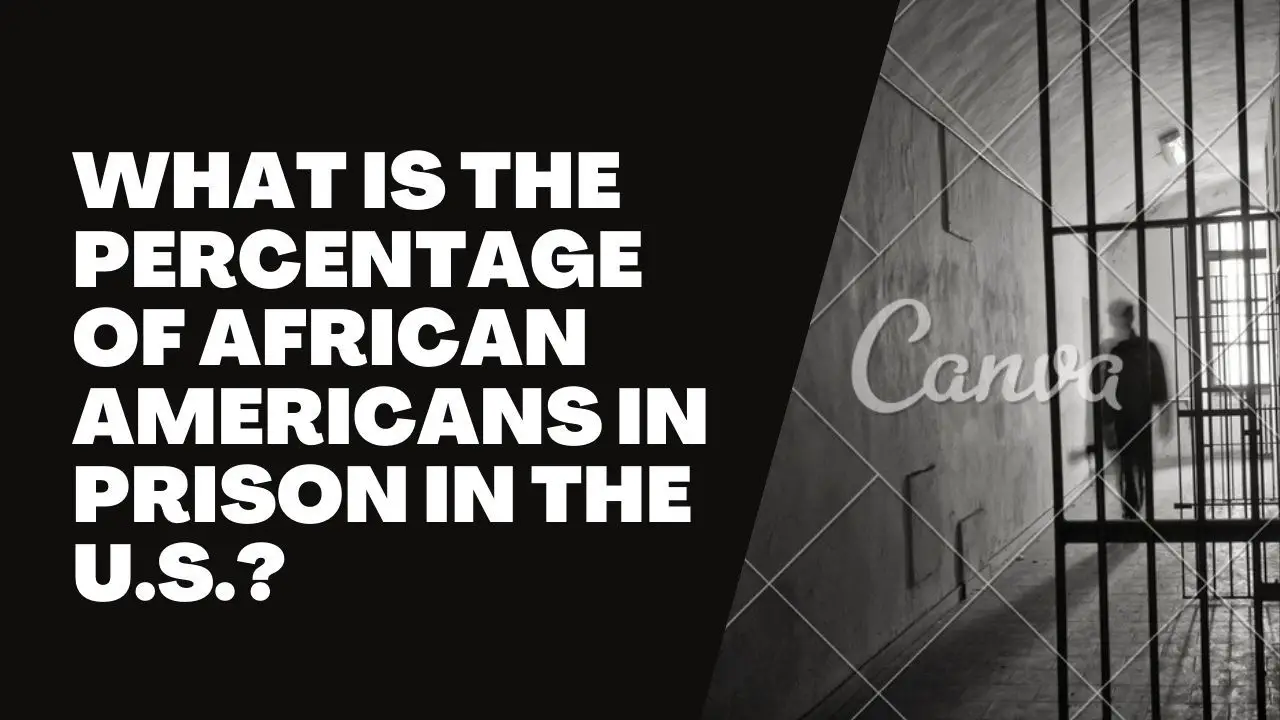What is the percentage of African Americans in Prison in the U.S.?
In this article, we will explore the origins of racial disparities in the U.S. criminal justice system, and delve into the factors contributing to the overrepresentation of African Americans in prisons.

The United States of America, known for its diversity and opportunities, is also grappling with a long-standing issue of racial disparities within its criminal justice system. Over the years, the statistics have revealed a stark reality - African Americans are disproportionately represented in the nation's prisons. The origins of this problem can be traced back to the historical legacy of slavery and discriminatory practices, which have had lasting effects on African American communities. In this blog, we will explore the origins of racial disparities in the U.S. criminal justice system, delve into the factors contributing to the overrepresentation of African Americans in prisons, and discuss the efforts to address these troubling disparities.
The Origins of Racial Disparities in the U.S. Criminal Justice System
To gain insight into the current state of affairs, it is essential to examine the historical origins of the U.S. criminal justice system. One of the earliest forms of law enforcement, the "Slave Patrol," emerged in the Carolinas during the early 1700s. The primary objective of these patrols was to instill fear and control over enslaved populations by apprehending and returning runaway slaves to their owners, often resorting to excessive force. This early policing system laid the groundwork for a structure perpetuating racial biases and oppressive practices.
Throughout history, African American communities have been disproportionately affected by discriminatory laws and practices, resulting in systemic disadvantages and a troubling cycle of incarceration. Despite the abolition of slavery and the passage of civil rights legislation, the legacy of this discriminatory system continues to linger, contributing to the persistent racial disparities in today's criminal justice system.
The Criminal Justice System: Police Bias and Law Enforcement
Law enforcement officials play a crucial role in the criminal justice system, but studies have consistently revealed racial disparities in their interactions with the public. African Americans, in particular, face higher rates of police stops, arrests, and use of force than their white counterparts. The US Constitution's Fourth Amendment protects from arbitrary seizures and searches. Still, its enforcement hasn't always been equitable—five times as many black people as white people are pulled over without a good reason. Men in the Black community are stopped by the police twice as frequently as Black women.
The issue of police brutality has become a pressing concern, as there have been numerous cases of unarmed Black Americans being shot and killed by law enforcement officers. Unfortunately, convictions for officers involved in such fatal shootings are rare, fueling further frustration and eroding trust within African American communities.
What is the percentage of African Americans in Prison in the U.S.?
The representation of African Americans in the U.S. prison system is a matter of great concern, with statistics revealing alarming disparities. By the end of 2018, there were 1,501 Black prisoners per 100,000 Black adults, marking a significant decrease from the 2,261 recorded in 2006.
The incarceration rate for African Americans is still more than five times greater than that of whites and nearly double that of Hispanics, notwithstanding this drop.
Of particular concern is the impact on Black men, who bear a disproportionate burden of incarceration. In contrast to 1,018 per 100,000 Hispanic males and 392 per 100,000 White men, there were 2,272 prisoners per 100,000 Black men in 2018. Despite constituting around 13% of the general population, African Americans account for 33% of the sentenced prison population.
Effects of Incarceration on African Americans and Communities
The repercussions of incarceration extend well beyond the individual behind bars, impacting families, communities, and society. For African Americans, these consequences are particularly profound.
Those incarcerated are more susceptible to experiencing mental health challenges and may lack access to crucial resources and support systems. Moreover, reintegrating into society after incarceration presents significant hurdles, including barriers to securing employment, housing, and education opportunities.
Children with parents in prison are at heightened risk of facing psychological strain, engaging in antisocial behavior, and experiencing economic hardship. This cycle of adversity perpetuates the overrepresentation of African Americans in the criminal justice system and further amplifies racial disparities.
Factors Contributing to Disparities in Sentencing and Convictions
Several factors contribute to the racial disparities in sentencing and convictions. One major issue is the widespread use of mandatory minimum sentences, which disproportionately affect minority groups.
Racial biases in jury selection and law enforcement practices also affect these disparities. African Americans are more likely to be involved in cases of police misconduct and often receive harsher penalties for comparable offenses than their white counterparts.
Moreover, socioeconomic factors come into play, as poverty and limited access to quality legal representation can lead to unequal outcomes within the justice system.
Efforts to Address Racial Disparities in the Criminal Justice System
Recently, there has been a growing awareness of the systemic racial disparities within the criminal justice system, which has sparked a series of efforts to rectify these inequities.
Even with some advancement, much more work is still required to attain true justice and equality. The following are some of the significant initiatives and strategies currently being pursued to address racial disparities in the criminal justice system:
Sentencing Reforms:
To acknowledge the impact of harsh sentencing policies on minority communities, several states have undertaken measures to reform their sentencing practices.
These reforms are intended to reduce the prevalence of mandatory minimum sentences and eliminate drug zone enhancements, which historically resulted in disproportionately lengthy sentences for African Americans and other minorities convicted of drug-related offenses.
Prosecutorial Reforms:
Elected prosecutors have emerged as influential agents of change within the criminal justice system. Some progressive prosecutors have implemented policies to address racial disparities, such as eliminating cash bail for low-level offenses.
By reducing pretrial detention, these reforms aim to prevent unnecessary incarceration of individuals who lack the financial means to post bail, disproportionately affecting impoverished communities.
Read How Does an Inmate File Taxes?
Decriminalization of Low-Level Offenses:
Recognizing the disproportionate impact of criminalizing certain low-level offenses on minority communities, some jurisdictions have decriminalized activities like marijuana possession.
Treating these offenses as civil violations rather than criminal charges allows law enforcement to allocate their resources more effectively, focusing on more serious crimes while reducing the number of individuals entering the criminal justice system for minor infractions.
Read Can You Visit Newgate Prison?
Community Policing and Accountability:
Increasing police accountability is crucial to addressing racial disparities in law enforcement. Many communities have embraced community policing models that prioritize building trust and fostering strong relationships between police officers and the communities they serve.
Training and Implicit Bias:
Police departments have been increasingly training officers on recognizing and addressing implicit biases. Implicit biases are unintentional attitudes and prejudices that might affect judgment.
By confronting and addressing these biases, law enforcement officers can make more objective and equitable judgments when interacting with the public.
Alternative Approaches to Incarceration:
The traditional incarceration model is being reevaluated, and alternative approaches are gaining traction. Instead of punitive measures, initiatives like drug courts, restorative justice, and diversionary programs seek to treat the underlying reasons for criminal conduct.
These options provide a more empathetic and successful reaction to crime while lowering recidivism rates.
Support for Reentry Programs:
Reentering society can be an immense challenge for individuals leaving the prison system. Reentry programs offer essential support, such as job training, housing assistance, and counseling, to help formerly incarcerated individuals successfully reintegrate into their communities.
By addressing the barriers returning citizens face, these programs can reduce the likelihood of recidivism and improve the chances of successful rehabilitation.
Our Conclusion
The overrepresentation of African Americans in the U.S. prison system is a multifaceted issue with deep historical roots. To achieve a fair and just criminal justice system for all Americans, it is essential to understand the historical context and recognize the existence of police bias.
We can only pave the way for a more equitable society for future generations through collective effort, empathy, and meaningful reforms.
